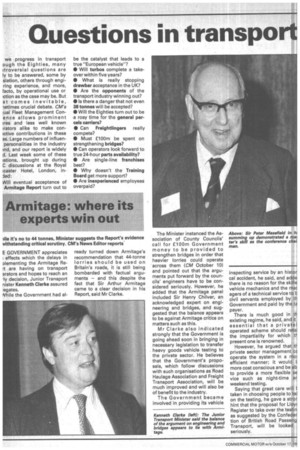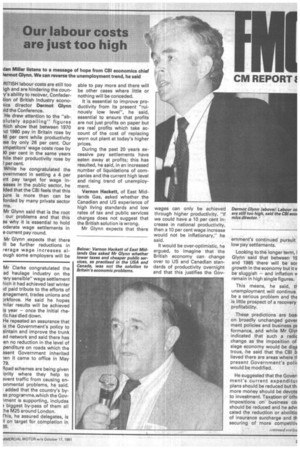Armitage. where its experts win out
Page 16

Page 17

If you've noticed an error in this article please click here to report it so we can fix it.
iile it's no to 44 tonnes, Minister suggests the Report's evidence vithstanding critical scrutiny. CM's News Editor reports'
E GOVERNMENT appreciates effects which the delays in Dlementing the Armitage Re-t are having on transport arators and hopes to reach an ly decision, Junior Transport nister Kenneth Clarke assured egates.
(elle the Government had al ready turned down Armitage's recommendation that 44-tonne lorries should be used on Britain's roads, it is still being bombarded with factual arguments — and this despite the fact that Sir Arthur Armitage came to a clear decision in his Report, said Mr Clarke. The Minister instanced the Association of County Councils' call for £100m Government money to be provided to strengthen bridges in order that heavier lorries could operate across them (CM October 10) and pointed out that the arguments put forward by the councils' engineers have to be considered seriously. However, he added that the Armitage panel included Sir Henry Chilver, an acknowledged expert on engineering and bridges, and suggested that the balance appears to be against Armitage critics on matters such as this.
Mr Clarke also indicated strongly that the Government is going ahead soon in bringing in necessary legislation to transfer heavy goods vehicle testing to the private sector. He believes that the Government's proposals, which follow discussions with such organisations as Road Haulage Association and Freight Transport Association, will be much improved and will also be of benefit to the industry.
The Government became involved in providing its vehicle inspecting service by an histor cal accident, he said, and adde there is no reason for the skille vehicle mechanics and the mar agers of a technical service to b civil servants employed by th Government and paid by the ta payer.
There is much good in th existing regime, he said, and it essential that a privatel operated scheme should retai the impartiality for which th present one is renowned.
However, he argued that th private sector management ea operate the system in a mo: efficient manner; it would more cost conscious and be ab to provide a more flexible se vice such as night-time ar weekend testing.
Saying that great care will t taken in choosing people to tal on the testing, he gave a stror hint that the proposal for Lloy( Register to take over the testin as suggested by the Confeder tion of British Road Passeng Transport, will be looked seriously.
Mr Clarke congratulated the .ad haulage industry on the Try sensible" wage settlement hich it had achieved last winter id paid tribute to the efforts of anagement, trades unions and orkforce. He said he hopes -nilar results will be achieved is year — once the initial rheric has died down.
He repeated an assurance that is the Government's policy to aintain and improve the trunk ad network and said there has ,en no reduction in the level of penditure on roads which the esent Government inherited len it came to office in May 79.
Road schemes are being given iority where they help to event traffic from causing enonmental problems, he said.
added that the country's byss programme,which the Goviment is supporting, includes 3 biggest by-pass of them all the M25 around London.
rhis, he assured delegates, is II on target for completion in 85.








































